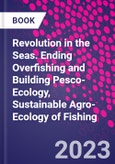Revolution in the Seas: Ending Overfishing and Building Pesco-ecology, Sustainable Agro-Ecology of Fishing provides an in-depth analysis of the dynamics between humans and disrupting marine ecosystems by extracting its wild animals. It highlights practical changes that can be implemented to prevent overfishing and create a new way of fishing, the pescoecology that benefits marine life, coastal communities, and human consumers alike.
Written by a leader in fisheries science and conservation, this book begins by diagnosing the issue of overexploitation, showing the dynamics and consequences on living marine resources and ecosystems. It then goes on to demonstrate how recent scientific discoveries, including tropic network functionality, are changing humans' approach to fishing sustainably. The final sections are devoted to ecological, economic, and social solutions.
Revolution in the Seas is a vital resource for fisheries scientists, managers, academics and students in marine biology or fisheries studies. All stakeholders and citizens involved in building a sustainable relationship between humans and the sea will also benefit from this book's revolutionary content.
Please Note: This is an On Demand product, delivery may take up to 11 working days after payment has been received.
Table of Contents
Part I - The Dynamics Of Overfishing The Marine Ecosystems
1. When humankind comes up against the limits of the biosphere
2. Warning, disruption in the marine ecosystems!
Part II - Fisheries Management
From Theory To Powerlessness
3. When theory helps us understand the world
4. The long battle for fisheries management
Part III- Three Radical Changes Required For A Revolution In The Seas
5. Maintain fishing and minimize the impact: The smart predator
6. Maximizing economic and social utility: With humankind as the goal
7. Guaranteeing the common interest: New democratic requirements
Authors
Didier Gascuel Institut Agro, Rennes, France.Didier Gascuel is an ecology professor at the Institut Agro in Rennes, France, where he is head of the Fisheries and Aquatic Sciences Center and leads a master's programme in Fisheries and Aquaculture Sciences. For nearly 30 years, he has been involved in the assessment of marine resources, fisheries, and ecosystems health, especially in European waters and in Western African countries. His current research focuses on the sustainable exploitation of marine resources and the modelling of the impacts of fishing and climate change on ecosystems. He is a member of the Scientific Committee of the French Institute for Ocean Science, Ifremer, and has been a member of the Scientific, Technical and Economic Committee for Fisheries (STECF, 2008-22) of the European Union. From 2009 to 2017, he was the chairman of the French Association of Fisheries Scientists, which actively contributes to the public debate on sustainability of human maritime activities. He has published more than 200 scientific articles and presented over the past 5 years nearly 100 conferences for the public across France, on various topics related to sustainable fishing, marine biodiversity, and the impacts of climate change.








